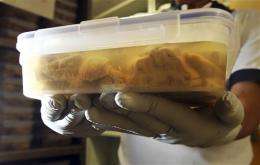Freezer damages brain samples used to study autism

(AP) — A freezer malfunctioned at a Harvard-affiliated hospital that oversees the world's largest collection of autistic brain samples, damaging a third of the scientifically precious specimens and casting doubt on whether they can be used in research.
The director of the Harvard Brain Tissue Resource Center said the loss was "devastating," particularly in light of the increasing demand for brain samples among scientists searching for the cause of autism and potential treatments.
"Over the last 10 years, the autism tissue program has been working very hard to get the autism community to understand the importance of brain donation," Dr. Francine Benes said. Now many of those samples have been compromised.
The freezer failed sometime late last month at the center, which is housed at McLean Hospital in the Boston suburb of Belmont. At least 54 samples earmarked for autism research were harmed. Many of them turned dark with decay.
However, an initial review indicates that the DNA in the samples is intact and can still be used for genetic research. It's unclear, however, whether the samples could be used for the full range of neuroscience needs.
An important chemical cousin of DNA called RNA was destroyed, she said.
Thirty-two of the brains had been cut in half, with one side placed in a formaldehyde solution and the other placed in the freezer. The samples in the solution remain available for all research projects, the hospital said.
Center officials say they've already completed an inspection of the equipment to ensure the safety of the collection.
Dr. Fred Volkmar, an autism researcher and director of the Child Study Center at Yale University, said the damage is even more disheartening given recent advances in autism research.
Some of that research, including autism studies involving stem cells, wasn't even possible at the time when some of the brains were donated.
"We can't always know where the science is going to take us," Volkmar said. "In that respect, it's a horrible loss. The hope is that at least it's not a total disaster."
The hospital launched an investigation to determine why the freezer malfunctioned and why two alarm systems failed to go off as the temperature rose.
Benes said her biggest fear is that the loss of samples could make it harder in the future to encourage brain donation from autistic children and young adults.
"There has been a lot of resistance of brain donations for religious and cultural reasons," she said.
The collection is owned by the advocacy and research organization Autism Speaks.
The Harvard Brain Tissue Resource Center is the largest and oldest federally funded "brain bank" in the United States. It provides thousands of postmortem brain tissue samples annually to researchers across the nation.
Copyright 2012 The Associated Press. All rights reserved. This material may not be published, broadcast, rewritten or redistributed.
















